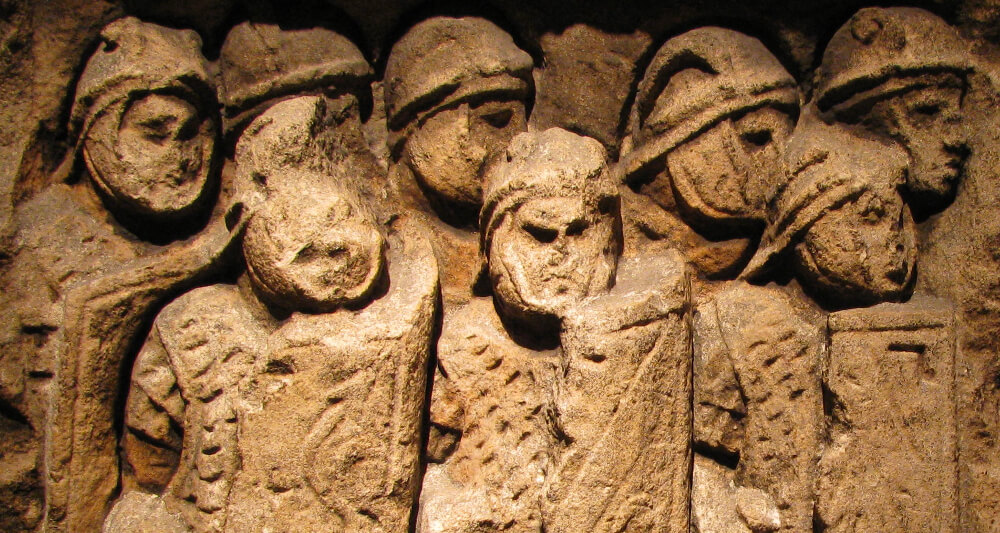
Having enclosed Ardea with fortifications, the Romans settle in for a long siege.
Catch up with the story so far in Part 2 "Temptata Res Est": https://hive.blog/proofofbrain/@hirohurl/translating-livy-s-account-of-the-rape-of-lucretia-part-2-temptata-res-est
Here is what I've been working on today:
in his stativus, ut fit longo magis quam acri bello, satis liberi commeatus erant, primoribus tamen magis quam militibus;
Statiuis? Stativus? Adjective? Noun?
I immediately fell into difficulty with that third word, "stativus," because in the online text I am working with it is rendered "statiuis". Looking at the sentence in the context of what came before, it appeared to me that "statiuis" looked a bit like "status" and so it might be translated as, "In these circumstances," id est, "in the circumstances of the siege," but that was a wild stab in the dark, and a complete mistake.
I checked the status of "statiuis" with ChatGPT, but it maintained that there was no such word in Latin, even when I grumbled that it was a quotation from Livy, the ROMAN HISTORIAN! LOL!
I gave up on my artificial friend and did a bit more digging elsewhere. Eventually, I realized that "statiuis" should actually be "stativus."
However, that created another problem. In the Oxford Latin Dictionary, "stativus" is given as an adjective that means "stationary, permanent," but in the text "stativus" is preceded by "in hoc" which means something like "in these..." and requires a plural noun.
This is where Latin can get tricky, especially the compressed Latin of Livy, because nouns are often omitted and implied from the context. So I put the question to ChatGPT:
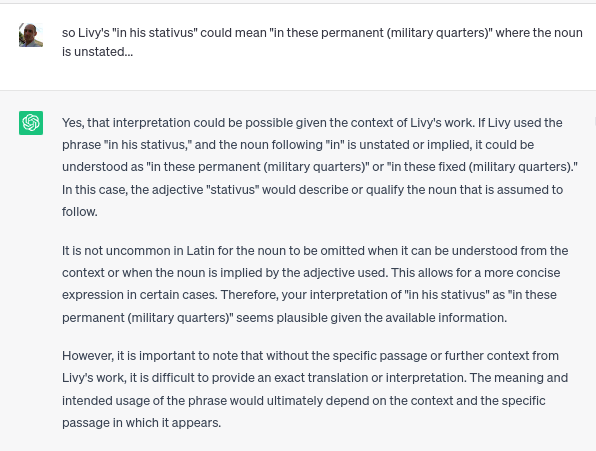
Okay, so the passage begins, "In these permanent quarters..."
As I was researching this I found a reference on Wikipedia to a permanent Roman military camp, which was a "castra stativa": 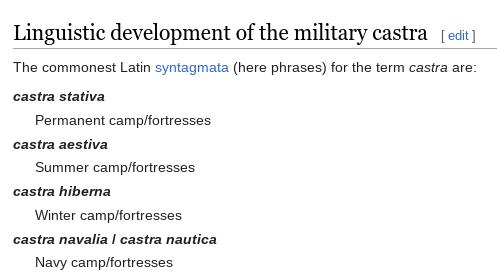 Source: https://en.wikipedia.org/wiki/Castra
Source: https://en.wikipedia.org/wiki/Castra
Moving on, the rest of the passage did not pose too many problems, except for the word "commeatus" which, in this context means something like, "going to and fro" or "passing back and forth."
However, the main dictionary translation suggests that it is about "supplies." Indeed, Google insisted on translating the phrase "satis liberi commeatus erant primoribus tamen magis quam militibus" ("the noblemen were sufficiently free to come and go, however, more than the soldiers") like this: 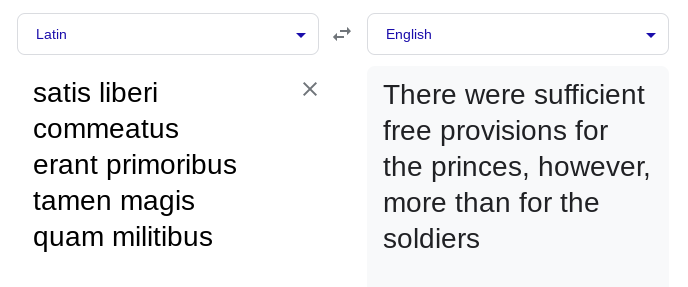
Out of context, that makes perfect sense, but the point is that, having shut in Ardea, the troops are just sitting out the siege and as they have plenty of free time the noblemen can come and go as they please. (Keep in mind that this is the pre-Republican period of Roman legend, and Ardea is only about 22 miles south of Rome.)
As I continued working on the passage, a pattern began to emerge:
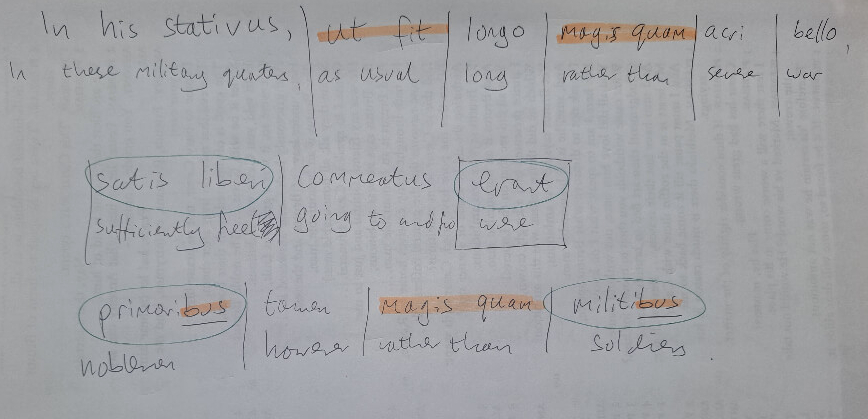
Magis Quam ... Magis Quam
With the enclosing fortifications in place, the war is set to be "long RATHER THAN severe" and so there is sufficient freedom to leave the camp, a privilege for the noblemen, however, RATHER THAN the common soldiers.
A more literal translation of the last part might be: "sufficiently free to come and go were the noblemen, however, more than the soldiers."
In the end, my completed translation went like this:
In these permanent military quarters, as is usual in a protracted rather than severe war, there was plenty of freedom to come and go, for the noblemen however, rather than for the common soldiers.
After I completed my translation I checked the 1919 translation of one, Benjamin Oliver Foster, Ph.d., which goes like this:
"Here in their permanent camp, as is usual with a war not sharp but long drawn out, furlough was rather freely granted, more freely however to the leaders than to the soldiers."
And here is an alternative translation by the Rev. Canon Roberts, made in 1912:
"When troops are stationary, as is the case in a protracted more than in an active campaign, furloughs are easily granted, more so to the men of rank however, than to the common soldiers."
And so now we are ready to put ChatGPT to the test. I wonder if it will translate "satis liberi commeatus erant" as "furloughs were easily granted..."
ChatGPT Gets It Wrong!
Nope, ChatGPT did not translate "commeatus" as "furlough" at all!
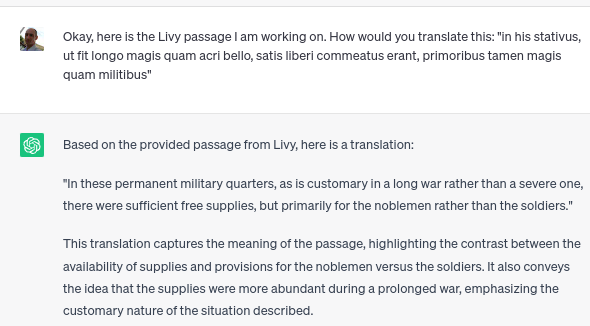
ChatGPT went with the main dictionary translation of "commeatus" as "supplies" even though, about an hour earlier, I had challenged ChatGPT on that very word:
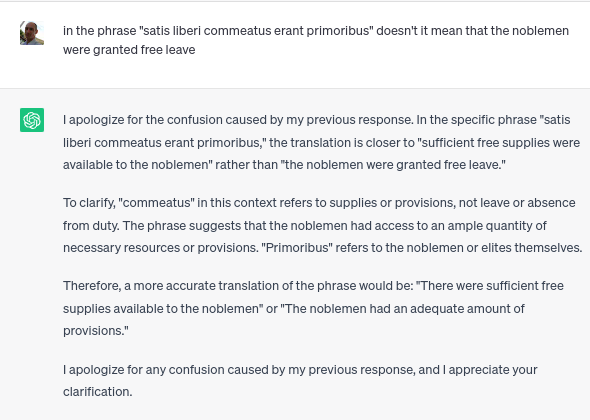
I tried again to get the point across:
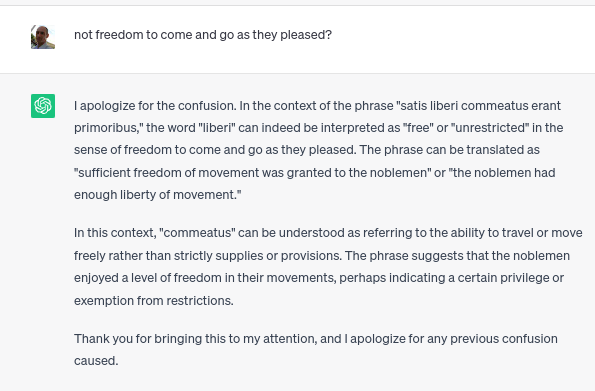
Well, so much for bringing things to ChatGPT's attention! One hour later, it still insisted on it's original translation of "commeatus."
In short, 21st century artificial intelligence is no match for good old English vicars and dons who were translating Livy with their own more than sufficient intelligence over century ago.
And on that cheerful note, I shall leave you.
Vale.
David Hurley
Resources:
Livy, Ab Urbe Condita Libri http://www.perseus.tufts.edu/hopper/text?doc=Perseus%3Atext%3A1999.02.0160%3Abook%3D1%3Achapter%3D57
Translation Part 1: https://hive.blog/livy/@hirohurl/translating-livy-s-account-of-the-rape-of-lucretia-part-1-ardeam-rutuli-habebant
Translation Part 2: https://hive.blog/proofofbrain/@hirohurl/translating-livy-s-account-of-the-rape-of-lucretia-part-2-temptata-res-est
Working with ChatGPT to translate Livy: https://hive.blog/proofofbrain/@hirohurl/working-with-chatgpt-to-translate-livy-s-latin-into-english-the-interrogation-process
Picture source: https://en.wikipedia.org/wiki/Roman_army
David Hurley
#InspiredFocus
https://davidhurleyinjapan.com